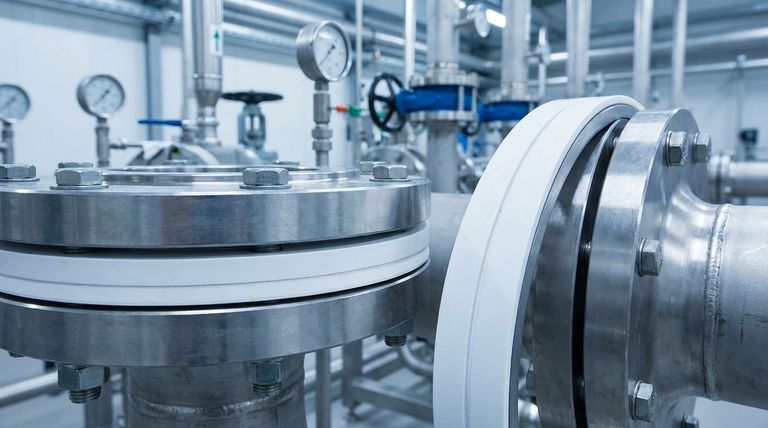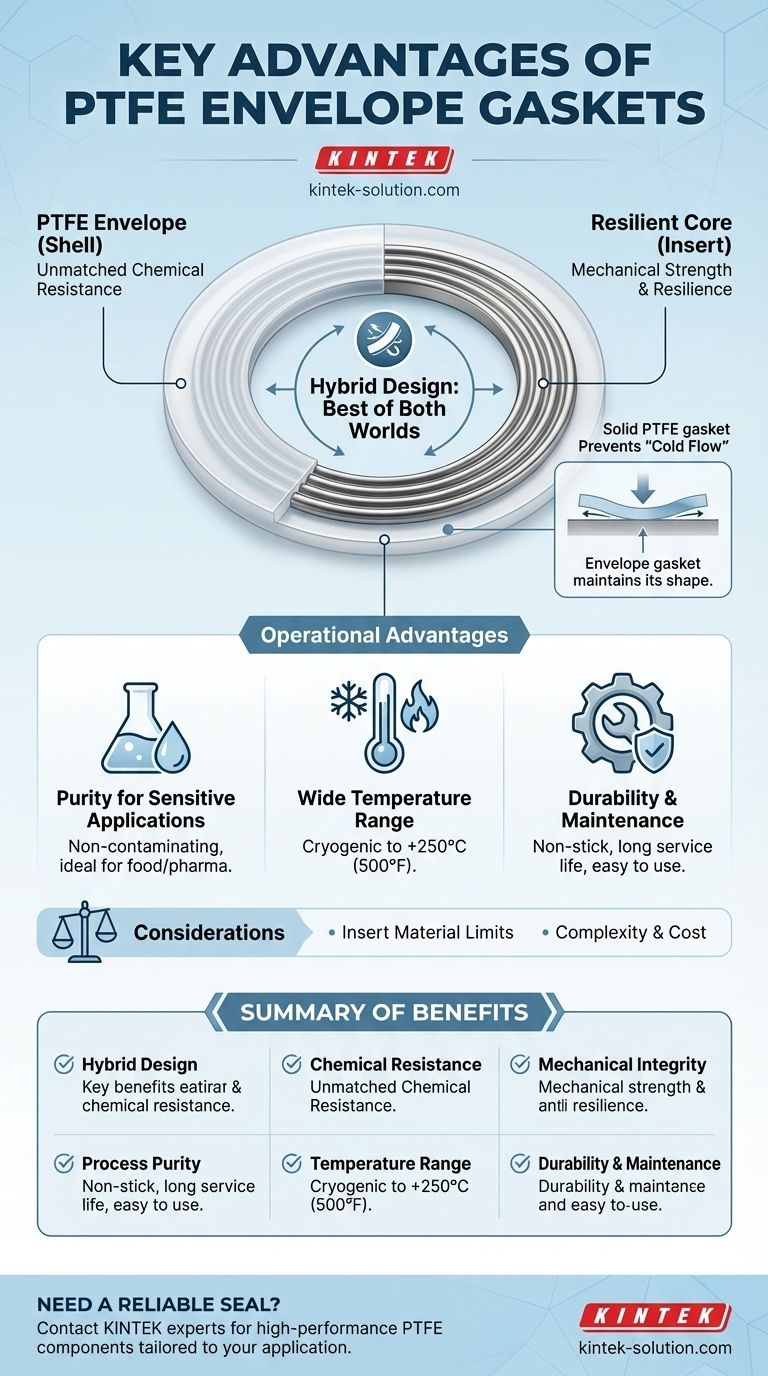The primary advantage of a PTFE envelope gasket is its unique hybrid design, which combines the near-universal chemical resistance of a Polytetrafluoroethylene (PTFE) shell with the mechanical strength and resilience of a different core material. This allows it to provide a reliable seal in aggressive chemical environments where the mechanical stresses, such as high pressure or flange imperfections, would cause a solid PTFE gasket to fail.
The core problem these gaskets solve is the inherent weakness of pure PTFE—its tendency to deform or "cold flow" under pressure. By encasing a stronger, more resilient insert material within a thin PTFE envelope, you get the unparalleled chemical protection of PTFE without sacrificing the mechanical integrity needed for a durable, long-lasting seal.

Why Choose an Envelope Gasket? The Best of Both Worlds
A PTFE envelope gasket isn't a single material but a clever composite system. Understanding this two-part construction is key to appreciating its value in demanding industrial applications.
The Unmatched Chemical Resistance of PTFE
The outer layer, or "envelope," is made of PTFE. This material is renowned for being one of the most chemically inert substances available.
This makes the gasket suitable for sealing against virtually all aggressive industrial chemicals, acids, and caustics, preventing corrosion and degradation of the seal itself.
Overcoming PTFE's Mechanical Weakness
While chemically robust, solid PTFE gaskets can deform permanently under the compressive load of flange bolts, a phenomenon known as cold flow or creep. This leads to a loss of sealing pressure and eventual leaks.
The envelope gasket solves this by using a mechanically stable insert material (such as non-asbestos, rubber, or corrugated metal). This inner core provides the compressibility, recovery, and structural strength that PTFE lacks.
The Result: Superior Sealing Performance
This combination provides a seal that can withstand high bolt loads and adapt to minor flange surface irregularities without cracking or breaking.
The PTFE provides the chemically-proof sealing face, while the insert provides the robust mechanical backbone, ensuring a tight seal even under high pressure and temperature fluctuations.
Key Operational Advantages
Beyond its core design principle, the PTFE envelope gasket offers several practical benefits that reduce costs and improve safety.
Purity for Sensitive Applications
Because PTFE is non-contaminating, odorless, and non-toxic, these gaskets are an excellent choice for the food, beverage, and pharmaceutical industries.
They ensure that the process media remains pure and free from contamination by the sealing material itself.
Wide Temperature Range
PTFE envelope gaskets can operate effectively across a broad temperature spectrum, typically up to +250°C (500°F).
This makes them highly versatile for processes that involve significant heat cycles, from cryogenic applications to moderately high-temperature chemical processing.
Durability and Ease of Maintenance
The non-stick, self-lubricating surface of PTFE simplifies installation and removal, as the gasket is less likely to adhere to flange surfaces.
This robust design leads to a longer service life, reducing the frequency of replacement and lowering overall maintenance costs.
Understanding the Trade-offs
While highly effective, the composite nature of envelope gaskets introduces specific considerations. No single solution is perfect for every scenario.
The Insert Material is a Limiting Factor
The overall performance of the gasket is limited by the weaker of its two components. The maximum temperature, pressure, and chemical compatibility are ultimately defined by the capabilities of the insert material as well as the PTFE shell.
Complexity and Cost
The multi-part construction makes them more complex and typically more expensive than simple, single-material gaskets like compressed non-asbestos or solid rubber sheets.
For applications with non-aggressive media and standard operating conditions, a simpler and more cost-effective gasket may be a more appropriate choice.
Making the Right Choice for Your Application
Selecting the correct gasket requires a clear understanding of your primary operational goal.
- If your primary focus is sealing aggressive chemicals or ensuring absolute media purity: The PTFE envelope gasket is likely the superior choice due to its inert PTFE sealing surface.
- If you need to balance chemical resistance with significant mechanical stress (high pressure or vibrations): The combination of a strong insert and a PTFE shell makes this gasket an ideal candidate.
- If your application involves non-corrosive media and operates under mild conditions: A simpler, less expensive gasket material may provide sufficient performance without the added cost.
Ultimately, the PTFE envelope gasket stands as a premier problem-solving seal for the most demanding chemical applications.
Summary Table:
| Advantage | Key Benefit |
|---|---|
| Hybrid Design | Combines PTFE's chemical resistance with a strong core's mechanical strength |
| Chemical Resistance | Seals against virtually all aggressive acids, caustics, and chemicals |
| Mechanical Integrity | Resists cold flow, adapts to flange imperfections, handles high pressure |
| Process Purity | Non-contaminating, ideal for food, pharmaceutical, and sensitive applications |
| Temperature Range | Effective from cryogenic temperatures up to 500°F (250°C) |
| Durability & Maintenance | Non-stick surface, easy installation/removal, long service life |
Need a reliable seal for aggressive chemical or high-pressure environments?
At KINTEK, we specialize in manufacturing high-performance PTFE components, including custom envelope gaskets. Our precision engineering ensures your seals provide the perfect balance of chemical resistance and mechanical strength for your specific application—whether in semiconductor, medical, laboratory, or industrial settings.
We offer custom fabrication from prototypes to high-volume orders, ensuring you get a gasket that solves your exact sealing challenges.
Contact our experts today to discuss your requirements and get a solution tailored for superior performance and durability.
Visual Guide

Related Products
- Custom PTFE Parts Manufacturer for Teflon Containers and Components
- Custom PTFE Parts Manufacturer for Teflon Parts and PTFE Tweezers
- Custom PTFE Measuring Cylinders for Advanced Scientific and Industrial Applications
- Custom PTFE Square Trays for Industrial and Laboratory Use
- Custom PTFE Volumetric Flasks for Advanced Scientific and Industrial Use
People Also Ask
- Why is dimensional stability a concern when machining PTFE? Ensure Accurate, Stable PTFE Components
- Why is PTFE considered a significant discovery? A Material That Revolutionized Industry
- How does PTFE compare to other low-friction plastics like UHMW-PE and Nylon? A Guide to Material Selection
- What is the temperature range that PTFE can withstand? From -200°C to +260°C for Demanding Applications
- What are some important physical property values for PTFE? Master Its Extreme Performance for Demanding Applications



















